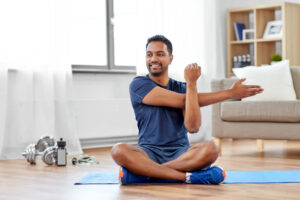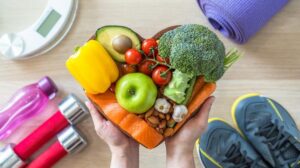It can be difficult to maintain excellent health when you have a busy schedule. You may put your health at the bottom of priority lists due to work deadlines, social commitments, and family obligations. Neglecting your health may lead to burnout and decreased productivity. It can also cause long-term issues with your wellness.
The good news is? It’s not necessary to spend hours in the gym or prepare elaborate meals to be healthy. Small changes, made strategically, can have a big impact on your mental clarity, energy, and well-being. This guide offers practical health essentials to fit into your busy lifestyle. It will help you feel better without adding more stress.
What is the Role of Hydration?
Water is the most vital fuel for your body, but we often forget it when busy. Dehydration can cause fatigue, headaches, and difficulty concentrating—symptoms that busy people often attribute to stress or lack of sleep. Even mild dehydration can affect your mood and cognitive performance.
A reusable bottle of water is the easiest way to stay hydrated all day. You can track your water intake using a bottle that displays measurements. Aim for 8 glasses of water per day. Add slices of cucumber, lemon, or mint to plain water for a natural flavor that doesn’t add calories or sugar. Set reminders to drink water at regular intervals. You can also download apps that monitor your intake and gently nudge you.
Caffeine has mild diuretic properties, so you should balance your coffee and tea with plain water. Keep water close at hand and drink it regularly, rather than waiting to feel thirsty.
Food on the Go
Routines that are too busy often cause people to skip meals or rely on processed foods, vending machines, and fast food. Maintaining steady blood sugar levels by eating regularly and nutritiously is essential for maintaining energy and focus during your busy days.
It doesn’t need to be difficult. Spend 30 minutes on the weekend washing and chopping fruit and vegetables. Next, store them in convenient containers for easy access. Hard-boiled eggs, Greek yogurt with nuts, and hummus and vegetables are all excellent portable snacks. They provide you with protein and will keep you fuller for longer than sugary alternatives.
If you must eat out, choose options that contain lean proteins, vegetables, and whole grains. Some restaurants offer lighter menus or allow substitutes such as salad instead of french fries. You can keep healthy emergency snacks like trail mix, dried fruit, and protein bars in your car or desk drawer.
Quick Workouts
Exercise does not require a gym membership or long sessions. Exercise in short bursts can improve your mood and energy levels, as well as help you manage stress better than you think. Even 10-15 minutes can have a significant impact on how you perform and feel.
HIIT workouts are the best way to get maximum results in minimum time. Repeat 20-30 seconds each of jumping jacks or squats and 10 seconds of rest for a total of 10-15 minutes. Exercises like planks, mountain climbers, or lunges can be performed anywhere.
Find ways to move more throughout the day. If possible, use the stairs rather than elevators, park further away, or walk when you are on the phone. You can work while using stability balls or standing desks. You can dance to your favorite music while getting ready or doing calf raises when brushing your teeth. These micro-workouts will add up.
Mindfulness Techniques
Mental health is as important as physical, especially in times of constant stress and conflicting demands. Chronic stress can affect your immune system and disrupt sleep. It may also contribute to anxiety or depression. By incorporating mindfulness into your daily routine, you can better manage stress and remain centered in the midst of chaos.
The 4-7-8 technique is one of the easiest ways to relieve stress. Inhaling for four counts, holding it for seven, and then exhaling for eight is the 4-7-8 technique. This simple exercise can be performed anywhere to activate your body’s relaxation response. You can do it during traffic jams or before important meetings.
Meditation does not require you to sit cross-legged on the floor for hours. Apps such as Headspace and Calm provide guided meditations that last as little as 3 to 5 minutes. This habit is perfect for those with busy schedules. Write down three things that you are grateful for every morning and evening. This simple habit will improve your mood and change your perspective, even in stressful times.
Prioritizing Sleep
For optimal health and performance, quality sleep is essential. Poor sleep can make you less effective and more likely to make mistakes. Adults require 7-9 hours of rest per night to maintain mental and physical health.
Create a bedtime routine to signal to your body that it is time to relax. Dimming the lights, turning off screens an hour before going to bed, or stretching lightly are all possible ways to achieve this. To promote better sleep, keep your bedroom dark, cool, and quiet. Consider using white noise machines or earplugs if you cannot control the outside noise.
Avoid large meals and caffeine after 2 pm, as they can affect sleep quality. Keep a notebook near your bed if your mind is racing with thoughts about tomorrow’s tasks. This will help you clear your mental clutter and jot down any ideas. Even with a packed schedule, sleep time is just as important.
Create Sustainable Health Habits
It takes time to develop healthy habits, especially when you have a busy schedule. Choose one or two small changes that you want to make. Add more healthy habits as soon as these practices become automatic. Consistency is more important than perfection. Doing something every day, even if it’s small, beats making sporadic intense efforts.
Use a method that suits you to track your progress, such as a smartphone application, a journal, or calendar checkmarks. Don’t let setbacks or small victories ruin your progress. Investing in your health today will prevent bigger problems down the road and improve your ability to manage your busy lifestyle.
FAQs
1. How do I stay healthy while I travel for my job?
Research healthy restaurant options and pack portable snacks such as protein bars and nuts. There are now healthier food options and walking paths in many airports. You can use the hotel gym or bodyweight exercises to work out in your room.
2. How can I eat healthily when I have no time to cook?
Simple combinations are best, such as pre-cooked protein with salads in a bag, Greek yogurt and fruit and nuts, or whole grain bread and avocado and eggs. Most grocery stores sell healthy, ready-to-heat meals.
3. Where can I locate the time to exercise when working 60 hours a week?
Exercise in smaller portions throughout the day. Exercise can be done in many ways. You can walk to meetings, exercise at your desk, climb stairs, or do a 10-minute workout each morning. Exercise can include weekend activities with friends or family.
4. Can a daily habit of 5-10 minutes really improve my health?
Absolutely. All of these things, including short meditation sessions, walking, drinking more fluids, and deep breathing, have measurable health benefits. Over time, small consistent actions can lead to significant improvements in health.
5. What can I do to manage stress eating if I am constantly under pressure?
You’ll have more options if you keep healthy snacks on hand. Take three deep breaths to test if you are actually hungry or stressed. You can also try calling a friend or going for a walk to relieve stress.




